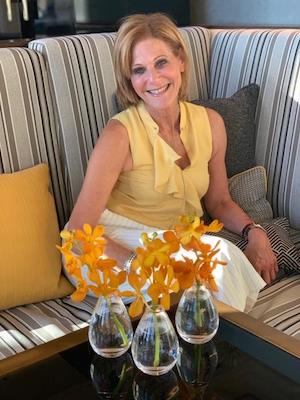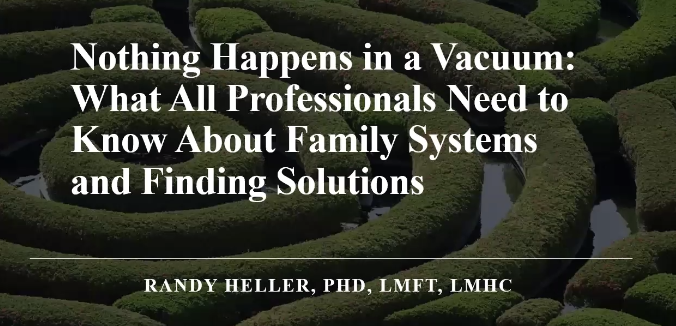"Out beyond right and wrong there is a field. I'll meet you there." -Rumi
Written by My Collaborative Team Member: Randy Heller, PhD
We All Learn All That is Possible When We All Work Together…
During this pandemic, this time of isolation, uncertainty, reflection, angst, and hope, I am continuously reminded how interrelated we all are. We are a global family, much like I experience in my Collaborative communities. Without us all working together, bringing our dedication and determination toward a positive outcome to the circumstances in our path, we won’t get there. We must all believe, that we have the knowledge, skill, and ability to make this happen. We must all do our part, and we will do this, together...
Interestingly enough, as I think about these ideas, I think about the underlying principles of Systems Theory and Collaborative Practice.
Think Systemically and Collaborate
Systems Theory and Collaborative Practice share the same philosophies. Both are based on the ideas of interconnectedness and relationship, the notion that the sum of the parts is greater than the whole, and the idea that if we listen to and utilize multiple perspectives, build on the strengths and the expertise inherent in all of the various parts of the system, we can influence each other toward the greater good. Systems Theory and Collaborative Practice punctuate the notions of envisioning possibilities. Both combine beliefs about the client as the expert, and the significance of minimizing judgment, promoting empathy, compassion, hope, and employing respect and unconditional positive regard for all people. Both take into consideration the reciprocal interactions of family members, the significance of multigenerational family patterns, and the implications of triangulating a third party into a dyad to regulate and deflect the anxiety in the system. Systems Theory and Collaborative Practice espouse the benefits of guiding people to creatively discover a way to do something different. Systems Theory and Collaborative Practice focus on the present, the future, and the discovery of solutions. It attends to the implication of the co-construction of language to discover a more viable reality with the understanding that as problems can be organized through language they also can be dissolved through language. Systems Theory and Collaborative Practice both set the context for transforming relationships between and among people and their problems by offering alternative ways for people to think about and manage their challenges at hand. Research suggests that as professionals from various disciplines begin to work together, they can bring their expertise to the arena, as they share knowledge and talents that will be useful to each other and divorcing couples.
Whose Fault is it Anyway?
“She’s bipolar, needy, and entitled; he’s narcissistic, controlling, and a bully; she cheated, and he was never home…He’s such a generous, good guy and she is not acknowledging that, or she’s making unilateral decisions and he has no say… She’s a great mother, he was never involved, until now when he is only concerned about child support…” Whenever I hear declarations like these at our Collaborative meetings I wonder, how are these statements useful? Where do they take us, the clients, the team, and the process? The tendency and need to blame, shame, and punish, can only lead to anger, disrespect, self-protection, defensive reactions, roadblocks and obstacles. What could happen instead in an atmosphere of understanding, empathy, and compassion? Imagine the possibilities…
There is More to it Than What Meets the Eye
I often remind people how we, as the professional team, walk in in the middle of our clients’ movie. We bring our assumptions into the room, and at that time, make decisions about our clients, their story, and their behavior that may not be correct at all. In my systemic studies, I learned how all behavior makes sense in context, and that no behavior happens in isolation. To my mind, rarely, if ever, is one person responsible for anything good or bad that happens. We are all learning that more clearly than perhaps ever before living during this pandemic. Much like the spread of the virus, the demise of a relationship, transpires between people, and is perpetuated by both of them, and the space between them. As we are experiencing during this time, being mindful of our actions, and how our actions influence and impact others, can facilitate change. What does any of this have to do with Collaborative Practice, you ask? Actually, it has everything to do with it!
Hope Floats – The Power of Words and Actions
Throw a pebble in a still pond, and what do you see? There is a ripple effect. Much like the spreading of this virus, or conversely, the strength endemic in the valiant efforts of our healthcare providers and essential workers, clergy, teachers, motivational speakers, newscasters, and other support systems who are getting us through the rain; positivity and hope floats. That notion does not suggest that we negate the gravity of any situation, however, it does suggest that we have an opportunity to embrace whatever thoughts and feelings the situation brings, and find a way to persevere. Every behavior has its roots in a thought and a feeling. Every thought precedes a feeling, every feeling precedes a behavior, and so on, and so on…
I Think, Therefore I Am
When you begin a new Collaborative matter, what are the thoughts that go through your mind and that you bring to the conference table? What do we accurately know about these people who have engaged us to guide them through? Who are your clients, and how do you describe them? What do we understand about their thoughts, fears, pain, and struggles, as well as their strengths, their resources, and their ability to manage the adversity that they are now faced with? How do we gain an understanding of who they are and what they need? How do we best meet those needs and assist them in getting their needs met? Who is right, and who is wrong? Who is good and who is bad? Who needs to listen and who needs to be heard? Who is the better parent, person, and even professional? Whose truth is the truth? What do you understand about the interactions between the divorcing couple, as well as their interactions with you that will contribute to a successful or challenging process? What do you contribute to that? How do you speak to your clients about their soon to be ex-spouse, and how do you speak to your team about your clients, and the process they are about to undertake? How do you speak to your teammates about the process you are about to commence? How do you encourage, empower, and instill hope, or conversely, how do you perpetuate anger, distress, and despair? I would venture to say that would never be your intention, however, you may not even realize how what you are doing to advocate for your client, to protect and defend, is actually perpetuating the very patterns and problems that brought these clients to this point. If you are a Systems Thinker, you will recognize that the way in which you think, talk about, about and respond to these questions will have all to do with how you function as a Collaborative professional, and the trajectory of your next Collaborative matter.
Open Your Mind and Widen Your Lens
So the next time you meet with your clients, open your mind and widen your lens, and you may be surprised by what you can see. Identify others’ strengths instead of their weaknesses, assist them to use their voice, instead of being their voice, embody respect, compassion, empathy, and positive regard. Keep your clients focused on their stated goals, out of the past, into the present, and toward the future. Remind them of the reason they chose and entered this process to begin with, help them to name their feelings, identify their needs, and to know, ultimately they will be in a better place. Model the behavior you are trying to demonstrate, and lead from a step behind. Enable clients to understand that anger, resentment, and punishment will be like “drinking poison and hoping the other person will die.” As we are leaning during this challenging time of the Corona Virus, we must fuel our process with hope, and instill the belief that once we can make adjustments, find solutions, even in the midst of this time of uncertainty, life will go on. Only then will good health and peace follow, spreading throughout the family system, and ultimately, throughout future families of future generations. Collaborative Practice, changing the world, one family at a time…
"Be the change you want to see."- Gandhi
View Dr. Heller's webinar:
Systems Thinking and Its Relevance to the Collaborative Process, hosted by Randy Heller, PhD, LMFT, LMHC. Dr. Randy Heller, Adjunct Professor of Marriage and Family Therapy at Nova Southeastern University, will present a 60 minute webinar on Family Systems Theory - teaching you how an understanding of this theory can transform your Collaborative Practice by enabling and empowering you to develop the necessary mindset to make the continued paradigm shift and do your best work. An understanding of this theory and its application is so important that it is now included in the requirements for credentialing in Florida.

Randy Heller, PhD, LMFT, LMHC received her doctorate in Family Therapy from Nova Southeastern University. She has held multiple positions as an Educator, Exceptional Student Specialist, and Family Counselor for The Broward County School Board beginning in 1980. She is now a Licensed Mental Health Counselor, Licensed Marriage and Family Therapist, Certified Supreme Court Family Mediator, Qualified Parenting Coordinator, Certified Hypnotherapist, as well as Founder and Clinical Director of The Family Network, Collaborative Counseling Center for Positive Growth and Change, established in 1994.
Contact Dr. Heller at thefamilynetwk@aol.com or by phone at (954) 236-4490




Excellent explanation of complex systems that so relates to our work! Thanks, Randy.